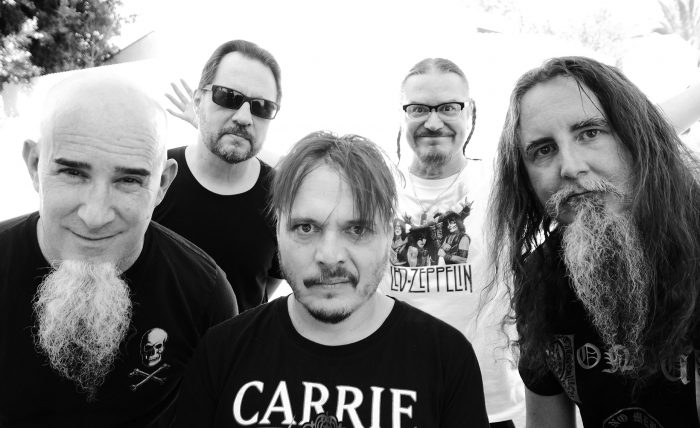A cloaked figure gazes upon a thousand-yard vista of turmoil, strife, and purgatory. In the …

Guitarist and whatever-the-hell Mr Bungle needs him to do at the time-ist Trey Spruance is all about Melvins playing with them on their upcoming Aussie tour.
“Melvins is the perfect band for us to play with,” Trey says from his Arizona home, leaning back on an office chair. He’s surrounded by guitars and musical bits and bobs, with many thanks to Zoom. “It’s been a long relationship that we have with them, and we have a similar outlook on how to construct, how to relate to an audience, how to play our music. We’re just very, very comfortable playing with them. They’re super legendary. Great band.”
That outlook might be do your own thing and have a blast doing it. Mr Bungle is a metal band in the same way an explosion is a solid. Everything transforms from one moment to the next and will likely leave you on your ass. Having been on-again, off-again, and most recently after re-recording The Raging Wrath of the Easter Bunny demo with none other than guitarist Scott Ian (Anthrax) and drummer Dave Lombardo (Slayer, Fantomas, Suicidal Tendencies, et. al.) how do they pull it all off live?
“Well, for this music, which is just really guitar music, it’s really different than our other stuff,” Trey says. “The role back then that the guitar played was definitely more of an orchestration tool. In other words, it’s sort of on the same level as all the different billion different kinds of keyboards that we had going. It didn’t really have an identity in and of itself. It’s just serving the needs of this part of music and then this part of music, and then this part of the music, so it’s switching. It’s like shamanically shapeshifting every few seconds or whatever. But the distortion is the same, the game is the same pretty much the whole time. All of the interest is in what you’re executing. So Scott and I are pretty much playing unison. We’re pretty much playing the same thing, and that choreography I think has, it’s a very different kind of approach to music than what Mr. Bun has done or did in the nineties that we’re known for, and even ’84 and ’85, when we were writing the music, it was just a one guitar band, but it’s kind of weak,” he laughs.
Weak?
“Well, [this music] needs Kerry King and Jeff Hanneman. It needs Hetfield and what’s that guy’s name…” he stares at the ceiling for a moment. “Kirk Hammett? Kirk Hammett. So you need the two guitars. You need KK Downing and Glenn Tipton, you know what I mean? Metal needs the two guitars, and somehow it’s just proving it when two people are doing it, it’s proof that it’s actually there. So maybe the trickiest part is, can the guy who’s going to play the other guitar really play all of those riffs? And when it comes to Scott, yes, he fucking can. It’s unbelievable. He can handle that stuff, no problem. I wouldn’t say no problem. He had to work for it, We worked our asses off on this music, but yeah, we got the two guitar thing down pretty solid.”
As for approaching the legendary Scott Ian, mainstay of thrash metal and New York’s representative of the Big Four of American Thrash, ringleader Mike Patton “dared” ask him to join, an offer which he pleasantly took up. Like they were kids asking their idols to buy them beer.
“It was also who would we dare ask to do this, and would we dare ask the main guy who inspired our writing and our riffing?” Trey says. “I mean, maybe let’s just ask him. Let’s see what he says. And it turned out Mike asked him, and it turned out that he was familiar with that demo tape. That really old obscure 1985 demo tape. He had it. He had heard the songs. He was familiar with that music, so he was excited to do it. So we were like, fuck, let’s go.”
As for Mr Bungle when they started, it was an excuse for a bunch of mates to hang out and rock to Slayer riffs. I mean, why else would you start a metal band? What other reason do you have for keeping it going?
“I think I was 14 when we first started, and Trevor [Dunn, bassist] and Mike were coming out of a thrash metal cover band, so they were literally playing Slayer, Metallica, Anthrax covers:. I had kind of a power metal band, I guess now it would be, I dunno, basically a fucking glam band. We didn’t have a vocalist, but we wrote our own music. So you put those two things together, the thrash metal thing, and then the kind of writing the originals. I brought the drummer in and we put Mike and Trevor and myself together, and the rest was very easy. They lit a fire under my ass. I started getting really interested in all of the broad listening that those two guys were doing and just absorbed. We started just bouncing all of this stuff off of each other, and it started with the death metal. But to be honest, man, while we’re sitting there listening to Possessed and Slayer and learning that kind of stuff, we’re also listening to Stravinsky. We’re starting to listen to all kinds of jazz and stuff. So really from the beginning, we were always going to be an experimental sort of genre, less band, but it started in the metal. That’s the root of the whole thing.”
There’s always musicianship, craftsmanship that comes from being a soulful musician and a fully cultivated person. So to me, it’s not a genre issue. It’s a conceptual issue of, ‘I’m going to be a shredder.’ Well, okay, you might as well give up because it’s boring and no one’s going to listen to you except for other shredders. So who gives a shit? I really believe that.
[ Trey Spruance ]
What’s even more incredible is that these relative newbies were covering complex songs that had only been released months prior. In early 1984, if a band wanted to play thrash, they could only tab out riffs from Show No Mercy, Kill ‘Em All, and Fist Full of Metal. Megadeth hadn’t even started yet. Even so, like jazz standards, we have thrash standards. Seek and Destroy. Black Magic. Evil Has No Boundaries.
“That was our first jam session,” Trey says. “Our first rehearsal. That’s what we were playing. It was all what I suppose we’d call ‘standards.’ Run To The Hills would be on there. They should make a book of all those riffs, you know,” he laughs.
NO SPOTIFY FOR BUNGLED MEN
Back in 2007, Trey as leader of Secret Chiefs 3 declared that he’d never buy an iPod. In the midst of the Spotify revolution, has he softened on that stance?
“No, I never bought an iPod, and I’ve never even touched Spotify. I mean, I am not going to pontificate about it. The main thing is I have the records that I like. I don’t need a streaming service to mediate that experience for me. iPod actually would be, at this point, would be pretty convenient thing now that the streaming services make you do everything through them. Even people who have iPods can’t even fucking use them anymore. So an iPod seems like a very convenient thing at this point compared to what’s happening now where you’re listening to shit on your phone or whatever. I’m not into any of that stuff.”
The quality sucks ass, too.
“Well, look at this studio,” Trey says, gesturing at his equipment. “You have all of this technology you have things have improved in audio. Absolutely they have. But the playback, we’re listening on shit, laptop speakers. You and I are conversing through shit, laptop microphones, everything gets pushed into these smaller and smaller crappier and crappier things. Then you get conditioned to listen on shitty laptop speakers, and you also get used to this terrible streaming bit rate and MP3s that have all this shit, and they don’t know how to fucking encode any of them, it’s a disaster.” Trey excuses himself as he darts around the house for a laptop charger. We get a mini-episode of Trey on MTV Cribs. (It wasn’t in his lounge, kitchen, den, or bathroom, for those playing at home. His laptop did eventually die.)
As Mr Bungle is an anything goes type of band, can an instrumentalist – or just guitarist – ever get bored playing this kind of music?
“I would make almost like an Oprah snippet out of it and say, if you’re bored, you’re boring,” Trey says. “There’s no way to get bored. How on earth do people get bored? You can do anything. Anything is possible with music. So I don’t recognise any limitations at all. I actually don’t understand why genre is even considered a limitation or why anybody confines themselves in it as if it is a limitation. A genre should be freeing. It should enable you to do things you wouldn’t otherwise be able to do, speaking a language. I really don’t see the point of thinking of it as confinement.
“Put it this way, when you listen to Eddie Van Halen, I don’t know, I guess the first thing you’re thinking, ‘there’s a rock guitar player here, so we’re in the genre of playing rhythm guitar in a rock band.’ I don’t really hear that. When I listen to Eddie Van Halen, I hear a musician who’s mastered the instrument. Then somebody who has absolute freedom and facility to do whatever he wants on the instrument. So if he wanted to switch gears and go somewhere else, he could. So the fact that he applied himself so much to learning the instrument in the idiom of rock music helped launch him into this place where he’s able to really pretty much do everything. And he was listening to Alan Holdsworth and shit. His ears weren’t confined. He wasn’t just listening to Eric Clapton. And I think guitarists often do box themselves in really weird ways, and it, van Helen is a great example of somebody who never did that, and it totally shows in his playing.
“I think people who get stuck in this idea of shredding…” Trey sighs. “The shredding thing really makes people’s ears tiny. Their minds shrink down into this little needle point thing where they’re going to get all intricate and do all of this sweeping, and it’s first of all fucking boring to listen to. For most people who are not musicians, and if you listen to Eddie Van Helen, there’s a lot more to it than just executing with facility. There’s all this nuance, there’s all this, the way it’s touched, he’s touching the thing. There’s always musicianship, craftsmanship that comes from being a soulful musician and a fully cultivated person. So to me, it’s not a genre issue. It’s a conceptual issue of, ‘I’m going to be a shredder.’ Well, okay, you might as well give up because it’s boring and no one’s going to listen to you except for other shredders. So who gives a shit? I really believe that.”
There’s an old Arizonian proverb: people will like you because you’re heavy and not because you’re Megadeth (well, Dave Mustaine lives in Arizona, right?) For Trey, if a band has moved on musically and you are stuck in the past, that’s really a you problem.
“The whole point of doing a recording even is you’re presenting your music to other people to listen to, so you do care what it sounds like, and you do care about being as articulate as possible for your ideas to come across,” he says. “It isn’t really like a ‘fuck everyone’ kind of thing, but it is, this is what we’re doing and we know that we’re committed to doing it and that we’ve put the time in to doing it as well as it could be done. So if it’s not for you, it’s not for you, that’s fine.
“If people don’t like it because it’s too weird or whatever, check back in five fucking years, they’re going to be like, ‘oh yeah, I was listening to that.’ I mean, sometimes things are just a little bit ahead of where the curve is.”
Much like The Velvet Underground & Nico selling only 30,000 (it was actually closer to 200,000) copies of their debut album (you know, the one with the banana you can peel off it) but Brian Eno saying later each person who bought a one was inspired to start a band. Fame is fickle, but influence lasts much, much longer.
“Chasing fame’s a painful path to walk. I don’t envy people who are on it at all,” Trey says. I still think it’s better to be that than to be the people who come after, the people who harvest the ideas and cultivate them and turn them into something that makes something that’s more popular and more widely embraced by the culture.
“I’d still rather be the one selling less records because maybe I’m lucky. I have proximity and I’ve seen what that fame cycle does to people and how temporary it is, how delusional people get when they get stuck in all that shit. And when you avoid it by not being popular, you actually don’t suffer all of that shit, and you’re more free and you have more longevity. Your ideas stick around a little longer.”
MR. BUNGLE
THE RAGING WRATH OF AUSTRALIA & NEW ZEALAND
WITH FELLOW POP STARS MELVINS
SUNDAY 3 MARCH – TOWN HALL, AUCKLAND
WEDNESDAY 6 MARCH – FESTIVAL HALL, MELBOURNE
THURSDAY 7 MARCH – HINDLEY ST MUSIC HALL, ADELAIDE
SATURDAY 9 MARCH – HORDERN PAVILION, SYDNEY
SUNDAY 10 MARCH – FORTITUDE MUSIC HALL, BRISBANE
TUESDAY 12 MARCH – METRO CITY, PERTH
For full ticketing and tour information, visit livenation.com.au & livenation.co.nz



